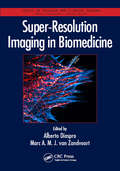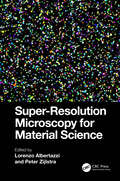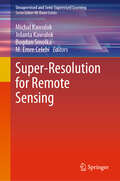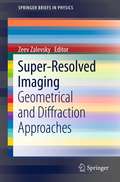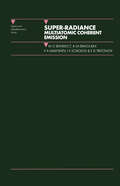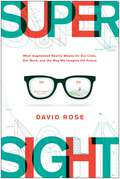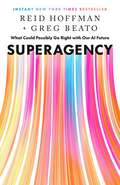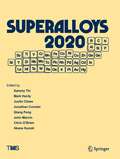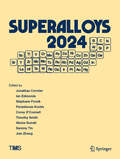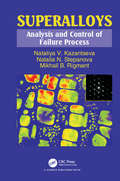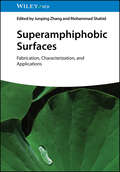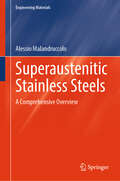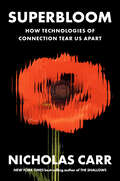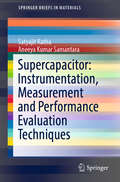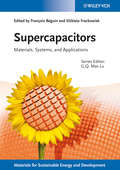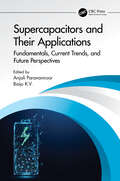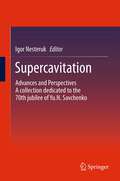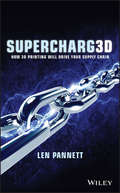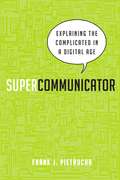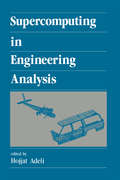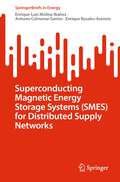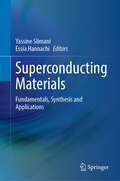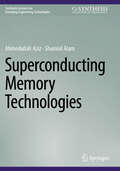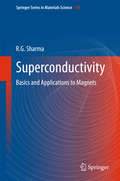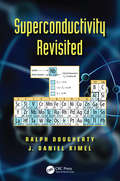- Table View
- List View
Super-Resolution Imaging in Biomedicine (Series in Cellular and Clinical Imaging)
by Alberto Diaspro and Marc A. M. J. van ZandvoortThis book encompasses the full breadth of the super-resolution imaging field, representing modern techniques that exceed the traditional diffraction limit, thereby opening up new applications in biomedicine. It shows readers how to use the new tools to increase resolution in sub-nanometer-scale images of living cells and tissue, which leads to new information about molecules, pathways and dynamics. The book highlights the advantages and disadvantages of the techniques, and gives state-of-the-art examples of applications using microscopes currently available on the market. It covers key techniques such as stimulated emission depletion (STED), structured illumination microscopy (SSIM), photoactivated localization microscopy (PALM), and stochastic optical reconstruction microscopy (STORM). It will be a useful reference for biomedical researchers who want to work with super-resolution imaging, learn the proper technique for their application, and simultaneously obtain a solid footing in other techniques.
Super-Resolution Microscopy for Material Science
by Lorenzo Albertazzi Peter ZijlstraOptical microscopy is one of the most frequently used tools in chemistry and the life sciences. However, its limited resolution hampers the use of optical imaging to many other relevant problems in different disciplines. Super-Resolution Microscopy (SRM) is a new technique that allows the resolution of objects down to a few billionth of meters (nanometers), ten times better than classical microscopes, opening up opportunities to use this tool in new fields.This book describes the theory, principles, and practice of super-resolution microscopy in the field of materials science and nanotechnology. There is a growing interest in the applications of SRM beyond biology as new synthetic materials, such as nanoscale sensors and catalysts, nanostructured materials, functional polymers, and nanoparticles, have nanoscopic features that are challenging to visualize with traditional imaging methods.SRM has the potential to be used to image and understand these cutting-edge man-made objects and guide the design of materials for novel applications.This book is an ideal guide for researchers in the fields of microscopy and materials science and chemistry as well as graduate students studying physics, materials science, biomedical engineering, and chemistry.Key Features: Contains practical guidance on Super-Resolution Microscopy (SRM), an exciting and growing tool that was awarded the Nobel Prize for chemistry in 2014 Provides a new perspective targeting materials science, unlike existing books which target readers in chemistry, life science, and biology Targets students in its core chapters, while offering more advanced material for professionals and researchers in later chapters
Super-Resolution for Remote Sensing (Unsupervised and Semi-Supervised Learning)
by M. Emre Celebi Michal Kawulok Bogdan Smolka Jolanta KawulokThis book provides a comprehensive perspective over the landscape of super-resolution techniques developed for and applied to remotely-sensed images. The chapters tackle the most important problems that professionals face when dealing with super-resolution in the context of remote sensing. These are: evaluation procedures to assess the super-resolution quality; benchmark datasets (simulated and real-life); super-resolution for specific data modalities (e.g., panchromatic, multispectral, and hyperspectral images); single-image super-resolution, including generative adversarial networks; multi-image fusion (temporal and/or spectral); real-world super-resolution; and task-driven super-resolution. The book presents the results of several recent surveys on super-resolution specifically for the remote sensing community.
Super-Resolved Imaging
by Zeev ZalevskyIn this brief we review several approaches that provide super resolved imaging, overcoming the geometrical limitation of the detector as well as the diffraction effects set by the F number of the imaging lens. In order to obtain the super resolved enhancement, we use spatially non-uniform and/or random transmission structures to encode the image or the aperture planes. The desired resolution enhanced images are obtained by post-processing decoding of the captured data.
Super-radiance: Multiatomic Coherent Emission (Series In Optics And Optoelectronics Ser.)
by M G Benedict A M Ermolaev V A Malyshev I V Sokolov E D TrifonovSuper-radiance: Multiatomic Coherent Emission provides a comprehensive, self-contained account of the theory and experiments of the quantum optic phenomenon of superradiance. Contributed by highly regarded researchers in the field, the book first presents the theory of superradiance at a level suitable for graduate physicists approaching the subject for the first time. This introduction is followed by a more rigorous treatment that is supported by the analysis of experiments dealing with superradiance and by a discussion on the possible uses of the effect in other areas of optics and electronics. The theoretical and experimental results presented in this book will introduce a wide audience to this important area of quantum optics.
SuperSight: What Augmented Reality Means for Our Lives, Our Work, and the Way We Imagine the Future
by David RoseNATIONAL INDIE EXCELLENCE AWARDS WINNER — NONFICTION 2022 IPPY AWARDS BRONZE MEDALIST — SCIENCE For thousands of years, human vision has been largely unchanged by evolution. We&’re about to get a software update. Today, Apple, Google, Microsoft, Facebook, Snap, Samsung, and a host of startups are racing to radically change the way we see. The building blocks are already falling into place: cloud computing and 5G networks, AI computer vision algorithms, smart glasses and VR headsets, and mixed reality games like Pokémon GO. But what&’s coming next is a fundamental shift in how we experience the world and interact with each other. Over the next decade, what we see and how we see it will no longer be bound by biology. Instead, our everyday vision will be augmented with digital information to give us what spatial computing pioneer David Rose calls &“SuperSight.&” And as our view of the world becomes blended layers of information delivered via glasses, contact lenses, or projected light, it will fundamentally change learning, shopping, work, play, and much, much more. David provides an insider&’s guide to the way our lives are about to change, while also unpacking the downsides of this coming world—what he calls the hazards of SuperSight, from equity and access issues to bubble filter problems—and proposing rational, actionable ways around them. From AI mirrors that advise us on our outfits, to museums that let us talk with deceased explorers and artists, to the ways we envision sustainable cities, the scope of augmented vision is boundless. SuperSight offers a rich speculative preview of the future and its implications, both shocking and thrilling.
Superagency: What Could Possibly Go Right with Our AI Future
by Reid Hoffman Greg BeatoInstant New York Times and USA Today Bestseller. Tech visionary and co-founder of Manas AI Reid Hoffman shares his unique insider’s perspective on an AI-powered future, making the case for its potential to unlock a world of possibilities. <p> "An essential companion." — Fei-Fei Li <p> "An important read." —Bill Gates <p> "Brilliant mind. Compassionate heart. Bold ideas…Read this book!” —Van Jones <p> "Refreshingly optimistic and welcome perspective." — Ariana Huffington <p> "A fascinating and insightful book." —Yuval Noah Harari <p> As taught at UPenn's Wharton and Stanford. Superagency offers a roadmap for using AI inclusively and adaptively to improve our lives and create positive change. While acknowledging challenges like disinformation and potential job changes, the book focuses on AI’s immense potential to increase individual agency and create better outcomes for society as a whole. Imagine AI tutors personalizing education for each child, researchers rapidly discovering cures for diseases like Alzheimer's and cancer, and AI advisors empowering people to navigate complex systems and achieve their goals. Hoffman and co-author, tech and culture writer Greg Beato envision a world where these possibilities, and many more, become a reality. <p> Superagency challenges conventional fears, inviting us to view the future through a lens of opportunity, rather than fear. It’s a call to action – to embrace AI with excitement and actively shape a world where human ingenuity and the power of AI combine to create something extraordinary. Entrepreneur Reid Hoffman is a co-founder of LinkedIn, Inflection AI, and Manas AI. He is also host of the podcasts Possible and Masters of Scale. <b>New York Times Bestseller</b>
Superalloys 2020: Proceedings of the 14th International Symposium on Superalloys (The Minerals, Metals & Materials Series)
by Chris O'Brien Mark Hardy Sammy Tin Justin Clews Jonathan Cormier Qiang Feng John Marcin Akane SuzukiThe 14th International Symposium on Superalloys (Superalloys 2020) highlights technologies for lifecycle improvement of superalloys. In addition to the traditional focus areas of alloy development, processing, mechanical behavior, coatings, and environmental effects, this volume includes contributions from academia, supply chain, and product-user members of the superalloy community that highlight technologies that contribute to improving manufacturability, affordability, life prediction, and performance of superalloys.
Superalloys 2024: Proceedings of the 15th International Symposium on Superalloys (The Minerals, Metals & Materials Series)
by Timothy Smith Jian Zhang Sammy Tin Jonathan Cormier Akane Suzuki Ian Edmonds Stephane Forsik Paraskevas Kontis Corey O’ConnellThe 15th International Symposium on Superalloys (Superalloys 2024) highlights technologies for lifecycle improvement of superalloys. In addition to the traditional focus areas of alloy development, processing, mechanical behavior, coatings, and environmental effects, this volume includes contributions from academia, supply chain, and product-user members of the superalloy community that highlight technologies that contribute to improving manufacturability, affordability, life prediction, and performance of superalloys.
Superalloys: Analysis and Control of Failure Process
by Nataliya V. Kazantseva Natalia N. Stepanova Mikhail B. RigmantSuperalloys form a class of the structural materials for high-temperature applications. Nickel superalloys are extensively used in the high-temperature components of gas turbines due to their excellent creep, fatigue, and corrosion resistance at elevated temperatures. These materials are considered paramagnetic in the range of working temperatures. This book presents the features of the ternary phase diagrams Ni-Al-X (X = {Co, Fe, Nb, Ti, Cr}), effects of the alloying on the long-range order and mechanical properties of the Ni3 Al-based alloys. Description of the strain-induced ferromagnetism in the Ni3Al-based alloys and magnetic control of the failure of gas turbine blades are also included. A separate section is devoted to the analysis of the vibration process and strength change in the single-crystal gas turbine blades. This book includes the review of the new intermetallic cobalt superalloys. The structure, crystal lattice parameters, orientation relationships between phases, mechanical and magnetic properties of the Co3(Al,W)-based alloys are described. Non-destructive magnetic point control of the martensite content in low-magnetic austenitic alloys is a new method for detection of the local sites with internal stresses. This method is useful for the detection of the residual stress in the critical parts of industrial products. This book may be useful for specialists in material science, first-year postgraduate students taking a class in material science and engineering, and engineers developing new alloys for the gas turbine technology.
Superamphiphobic Surfaces: Fabrication, Characterization, and Applications
by Mohammad Shahid Junping ZhangA definitive resource on superamphiphobic surfaces, covering their fabrications, characterizations, practical applications, challenges, and future directions Superamphiphobic Surfaces: Fabrication, Characterization, and Applications addresses a critical knowledge gap in the field of superamphiphobic surfaces, a class of materials with the extraordinary ability to repel water, oil, and other liquids, by both exploring their fundamentals and also offering detailed insights into their fabrication techniques, characterization methods, and durability considerations. The book presents practical applications of superamphiphobic surfaces in self-cleaning, anti-fouling, environmental clean-up, biomedicine, and food packaging and processing. The book is divided into five parts. Part I lays the foundation for understanding superamphiphobic surfaces by introducing the fundamental principles that govern their behavior. Part II discusses the fabrication techniques developed to produce superamphiphobic surfaces with varying complexity, durability, and functionality. Part III provides guidelines to evaluate the performance of superamphiphobic surfaces. Part IV highlights several key areas where these surfaces are already being applied. Part V addresses the current challenges and prospects of superamphiphobic surfaces. Written by an experienced team of researchers, Superamphiphobic Surfaces covers sample topics such as: The increased level of sophistication required to achieve superoleophobicity, particularly for liquids with low surface tensionContact angle hysteresis, wetting regimes, and the role of micro- and nanoscale structures in achieving extreme liquid repellencySpecific challenges associated with scaling up fabrication techniques in industrial applicationsPerformance criteria including mechanical durability, resistance to liquid impalement, and self-healing capabilitiesThe lifespan of various materials in harsh environments such as oil rigs, pipelines, and marine vessels Empowering readers with knowledge to drive innovation, solve practical problems, and enhance their expertise, Superamphiphobic Surfaces is an essential reference for researchers and professionals in materials science, healthcare, environmental protection, and other fields.
Superaustenitic Stainless Steels: A Comprehensive Overview (Engineering Materials)
by Alessio MalandruccoloThis book provides an exhaustive overview of a class of materials with distinct mechanical and corrosion resistance properties: superaustenitic stainless steels. It strives to fill the gap in the literature on these materials by offering a comprehensive overview based on the author's experience in the metallurgical industry and by organizing information from the available literature. Topics are presented in a structured and detailed manner, accompanied by images and graphs created specifically for this book, including original material like optical micrographs Special attention is also given to cultural-historical aspects that are often overlooked but are critical for understanding the characteristics of the material. Superaustenitic stainless steels (SASSs) take the characteristics of austenitics to the extreme for maximum performance and feature a complex chemical composition of high Cr, Ni, Mo, and N content. The book is divided into four parts: an introduction to stainless steels, a chapter on the specific metallurgy of SASSs, a section on mechanical, physical, and corrosion resistance properties, and a chapter on production technologies, processing, and uses. It also includes extended appendices on the effects of alloying elements in steels and on the characteristics of the phases found in stainless steels. The book is addressed to a wide audience, from university students to professionals and consultants in the field who need literature support to innovate on materials and production processes.
Superbloom: How Technologies of Connection Tear Us Apart
by Nicholas CarrOne of Literary Hub's Most Anticipated Books of 2025 From the author of The Shallows, a bracing exploration of how social media has warped our sense of self and society. From the telegraph and telephone in the 1800s to the internet and social media in our own day, the public has welcomed new communication systems. Whenever people gain more power to share information, the assumption goes, society prospers. Superbloom tells a startlingly different story. As communication becomes more mechanized and efficient, it breeds confusion more than understanding, strife more than harmony. Media technologies all too often bring out the worst in us. A celebrated commentator on the human consequences of technology, Nicholas Carr reorients the conversation around modern communication, challenging some of our most cherished beliefs about self-expression, free speech, and media democratization. He reveals how messaging apps strip nuance from conversation, how “digital crowding” erodes empathy and triggers aggression, how online political debates narrow our minds and distort our perceptions, and how advances in AI are further blurring the already hazy line between fantasy and reality. Even as Carr shows how tech companies and their tools of connection have failed us, he forces us to confront inconvenient truths about our own nature. The human psyche, it turns out, is profoundly ill-suited to the “superbloom” of information that technology has unleashed. With rich psychological insights and vivid examples drawn from history and science, Superbloom provides both a panoramic view of how media shapes society and an intimate examination of the fate of the self in a time of radical dislocation. It may be too late to change the system, Carr counsels, but it’s not too late to change ourselves.
Supercapacitor: Instrumentation, Measurement and Performance Evaluation Techniques (SpringerBriefs in Materials)
by Satyajit Ratha Aneeya Kumar SamantaraThis book discusses the instrumentation of supercapacitors, various measurement procedures and the techniques used for the performance evaluation, to help determine the appropriate methodology for the evaluation of a supercapacitor device and also to identify the inconsistencies between the device performance and electrode material properties. As a promising energy storage option, supercapacitors need to be readied for commercialization rather than confined within the niche of academic research. This book also assists in the formulation of strict performance guidelines aided by realistic evaluation techniques, so that these devices can be made available to society through industrial production. As such it is an important read not only for academicians and researchers, but also for industry and policymakers.
Supercapacitors
by Max Lu Francois Beguin Elzbieta FrackowiakSupercapacitors are a relatively new energy storage system that provides higher energy density than dielectric capacitors and higher power density than batteries. They are particularly suited to applications that require energy pulses during short periods of time, e.g., seconds or tens of seconds. They are recommended for automobiles, tramways, buses, cranes, fork-lifts, wind turbines, electricity load leveling in stationary and transportation systems, etc. Despite the technological maturity of supercapacitors, there is a lack of comprehensive literature on the topic. Many high performance materials have been developed and new scientific concepts have been introduced. Taking into account the commercial interest in these systems and the new scientific and technological developments now is the ideal time to publish this book, capturing all this new knowledge. The book starts by giving an introduction to the general principles of electrochemistry, the properties of electrochemical capacitors, and electrochemical characterization techniques. Electrical double layer capacitors and pseudocapacitors are then discussed, followed by the various electrolyte systems. Modelling, manufacture of industrial capacitors, constraints, testing, and reliability as well as applications are also covered. 'Supercapacitors - Materials, Systems, and Applications' is part of the series on Materials forSustainable Energy and Development edited by Prof. G.Q. Max Lu. The series covers advances in materials science and innovation for renewable energy, clean use of fossil energy, and greenhouse gas mitigation and associated environmental technologies.
Supercapacitors and Their Applications: Fundamentals, Current Trends, and Future Perspectives
by Anjali Paravannoor and Baiju K. V.Owing to their high-power density, long life, and environmental compatibility, supercapacitors are emerging as one of the promising storage technologies, but with challenges around energy and power requirements for specific applications. This book focusses on supercapacitors including details on classification, charge storage mechanisms, related kinetics, and thermodynamics. Materials used as electrodes, electrolytes, and separators, procedures followed, characterization methods, and modeling are covered, along with emphasis on related applications. Features: Provides an in-depth look at supercapacitors, including their working concepts and design Reviews detailed explanation of various characterization and modeling techniques Give special focus to the application of supercapacitors in major areas of environmental as well as social importance Covers cyclic voltammetry, charging–discharging curves, and electrochemical impedance spectroscopy as characterization techniques Includes a detailed chapter on historical perspectives on the evolution of supercapacitors This book is aimed at researchers and graduate students in materials science and engineering, nanotechnology, chemistry in batteries, and physics.
Supercavitation
by Igor NesterukThis collection is dedicated to the 70th jubilee of Yu. N. Savchenko, and presents experimental, theoretical, and numerical investigations written by an international group of well-known authors. The contributions solve very important problems of the high-speed hydrodynamics,such as supersonic motion in water, drag diminishing, dynamics and stability of supercavitating vehicles, water entry and hydrodynamic performances of hydrofoils, ventilated cavities after a disc and under the ship bottom. The book is written for researches, scientists, engineers, and students interested in problems of hydromechanics.
Supercharg3d: How 3D Printing Will Drive Your Supply Chain
by Len PannettA strategic and operational guide to using 3D printing to drive value in the supply chain—featuring case studies and illustrated examples from across industries After many years as a tool for designers, 3D printing today promises to revolutionize supply chains. Cut through the hype and hyperbole, and it becomes clear that it offers unprecedented potential to redesign supply chain models, simplifying and shrinking them, enabling previously unimaginable designs to be produced where they are most needed. However, adopting it is a strategic endeavor, one that involves the consideration of several wider implications. This book goes beyond touting the latest technological advances or listing the many wonderful things that 3D printing is being used to make. It teaches readers what is important about 3D printing, why they need to prepare for its emergence today, and how they can go about adopting it. Supercharg3d: How 3D Printing Will Drive Your Supply Chain shows readers how to drive value in their supply chain by supercharging it—giving it more power—with 3D printing. Aimed at being a first reference for those in businesses who make strategic decisions on operations and supply chain matters, it takes a pragmatic position, balancing the opportunities that 3D printing presents with the reality of the limitations that it continues to have, so that readers can make the best decisions possible. Strategic guide that covers 3D printing and its implications in the supply chain Operational guidance and best practices for how and when 3D printing can be adopted Identification of 3D printing’s impacts on the individual SCOR® supply chain elements Features new, transformative supply chain models that are enabled by 3D printing Includes case studies and illustrated examples from diverse industries including aerospace (Airbus), energy (Shell), consumer goods (Nike), medical (Align Technology) and transportation (Deutsche Bahn) Supercharg3d: How 3D Printing Will Drive Your Supply Chain is the go-to book for operations and supply chain decision makers in manufacturing, engineering and technology companies looking to incorporate the technology into their business operations.
Supercommunicator: Explaining the Complicated So Anyone Can Understand
by Frank J. PietruchaIn our increasingly complicated and data-driven world, many new developments are so complex that only experts comprehend their nuances. But what they don't grasp is how to tell the world about them. Communicating technical content to nontechnical listeners has fast become a critical 21st-century skill. Explaining what you do and why it's important drives funding, policy decisions, media exposure, public awareness, and customer adoption. This groundbreaking guide will help anyone to deliver clear, persuasive messages that win hearts, minds, and budgets. Supercommunicator explains how to: Distill details and data into big ideas Deliver meaning to audiences Use storytelling to captivate and educate Humanize content to make complicated ideas more tangible Layer harder ideas on top of easier ideas Strip away complex language, jargon, and acronyms Use analogies to explain unfamiliar areas Master new digital modes of expression And more Enhanced with a wealth of examples--from how the National Academy of Sciences used audience research to improve the way evolution is taught, to how NASA incorporated cutting-edge tools to visualize issues in climatology--this one-of-a-kind book reveals how to make the complex comprehensible, and the dry deeply compelling.
Supercomputing in Engineering Analysis (New Generation Computing Ser. #1)
by Hojjat AdeliThe first volume in this new series has a companion in volume 2 (unseen), Parallel processing in computational mechanics . The first six contributions present general aspects of supercomputing from both hardware and software engineering points of view. Subsequent chapters discuss homotopy algorithms
Superconducting Magnetic Energy Storage Systems (SpringerBriefs in Energy)
by Antonio Colmenar-Santos Enrique Rosales-Asensio Enrique-Luis Molina-IbáñezThis book explores the potential of magnetic superconductors in storage systems, specifically focusing on superconducting magnetic energy storage (SMES) systems and using the Spanish electricity system, controlled by Red Eléctrica de España (REE), as an example.The book provides a comprehensive analysis of the economic costs associated with the manufacture and maintenance of SMES systems, as well as a regulatory analysis for their implementation in the complex Spanish electrical system. The analysis also compares this system with the regulations of other countries, providing a comprehensive case study.The book examines the possible economic and environmental benefits of using magnetic superconductors in electrical systems and provides a technical study of the use of these systems in hybrid storage systems that complement each other to optimize network performance. The study is conducted from the perspective of new distribution networks, distributed generation, and the concepts of the smart city. The book also explores potential applications and developments, such as electric vehicles.Overall, this book offers an insightful and comprehensive analysis of the potential of magnetic superconductors in storage systems. It will be an invaluable resource for researchers, engineers, and policymakers interested in the future of energy storage systems
Superconducting Materials: Fundamentals, Synthesis and Applications
by Yassine Slimani Essia HannachiThis book presents an overview of the science of superconducting materials. It covers the fundamentals and theories of superconductivity. Subjects of special interest involving mechanisms of high temperature superconductors, tunneling, transport properties, magnetic properties, critical states, vortex dynamics, etc. are present in the book. It assists as a fundamental resource on the developed methodologies and techniques involved in the synthesis, processing, and characterization of superconducting materials. The book covers numerous classes of superconducting materials including fullerenes, borides, pnictides or iron-based chalcogen superconductors ides, alloys and cuprate oxides. Their crystal structures and properties are described. Thereafter, the book focuses on the progress of the applications of superconducting materials into superconducting magnets, fusion reactors, and accelerators and other superconducting magnets. The applications also cover recent progress in superconducting wires, power generators, powerful energy storage devices, sensitive magnetometers, RF and microwave filters, fast fault current limiters, fast digital circuits, transport vehicles, and medical applications.
Superconducting Memory Technologies (Synthesis Lectures on Emerging Engineering Technologies)
by Ahmedullah Aziz Shamiul AlamThere is a lot of excitement around quantum computers that use superconducting qubits, which operate at extremely low temperatures since they are ultra-sensitive to noise. These quantum computers need a memory and control processor that can operate under cryogenic conditions. Among the cryogenic memory technologies, superconducting memories are the most efficient and compatible for these purposes. They can help advance quantum computing, facilitate high-performance computing, and explore space more effectively. However, cryogenic memory technologies currently face various challenges. This book discusses the latest advancements in superconducting memory technologies. It covers four main types of superconducting memories: Josephson junction-based, magnetic Josephson junction-based, superconducting memristor-based, and ferroelectric superconducting quantum interference device-based memories. The book explores the background, working principles, and challenges of each of these technologies, providing a comprehensive overview of the field.
Superconductivity
by R. G. SharmaThis book presents the basics and applications of superconducting magnets. It explains the phenomenon of superconductivity, theories of superconductivity, type II superconductors and high-temperature cuprate superconductors. The main focus of the book is on the application to superconducting magnets to accelerators and fusion reactors and other applications of superconducting magnets. The thermal and electromagnetic stability criteria of the conductors and the present status of the fabrication techniques for future magnet applications are addressed. The book is based on the long experience of the author in studying superconducting materials, building magnets and numerous lectures delivered to scholars. A researcher and graduate student will enjoy reading the book to learn various aspects of magnet applications of superconductivity. The book provides the knowledge in the field of applied superconductivity in a comprehensive way.
Superconductivity Revisited
by Ralph Dougherty J. Daniel KimelWhile the macroscopic phenomenon of superconductivity is well known and in practical use worldwide, the current theoretical paradigm for superconductivity suffers from a number of limitations. For example, there is no currently accepted theoretical explanation for the pattern of superconductor critical temperatures in the periodic table. Historical
